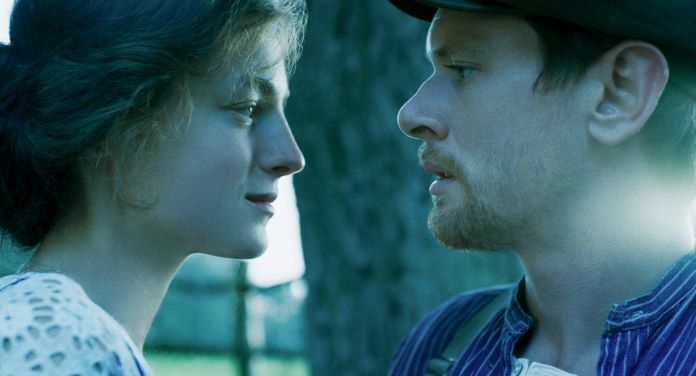After at least seven film adaptations and two BBC television versions, is there anything fresh to be found in bringing D.H. Lawrence’s once-controversial 1928 novel Lady Chatterley’s Lover back to the screen? Drawing on a script by David Magee (Finding Neverland) that gives its titular heroine a bit more agency than found in previous incarnations, French director Laure de Clermont-Tonnerre (The Mustang) follows in the footsteps of her compatriots Pascale Fernan (2006’s Lady Chatterley) and Marc Allégret (1955’s L’Amant de Lady Chatterley) with a surprisingly dull interpretation that is never as modern or steamy as it aims to be.
The film opens on Constance Reid’s (Emma Corrin) wedding day as she eagerly recites her marital vows to the aristocratic Sir Clifford Chatterley (a brittle Matthew Duckett). But she is no virginal, blushing bride, having previously given herself to a German boy, now dead, a casualty of World War I. “You give your heart too easily,” her sister Hilda (a spiritedly bohemian Faye Marsay) warns Connie as she changes for the reception. On their wedding night, the man Connie has given her heart to reveals himself to be a tentative, if not frigid, lover, although his nervousness might also be due to his shipping out to the front the next day. (In Lawrence’s novel, the couple enjoy a month’s honeymoon, in which “the sex part did not mean much to him.”)
Six months later, the Chatterleys arrive at Wragby, the family estate in England’s industrial Midlands. Clifford, seriously wounded in the war, is confined to a wheelchair, and the intimate marital partnership Connie had dreamed of deteriorates into a sexless life of servitude and loneliness as she cares for an impotent, distant husband, who casually proposes she take a lover so that he can have an heir. “I wouldn’t want you to completely yield yourself to him,” he notes coldly, “but the mechanics of sex is nothing to a life lived together.”
The physical and emotional challenges take a toll on Connie’s health, and her sister demands that Clifford hire Mrs. Bolton (a warmhearted Joely Richardson, who played Lady Chatterley in the 1993 BBC adaptation) to take over the caretaking. Freed from her domestic duties, Connie explores the fields and woods of Wragby on her daily walks, and spies the rugged gamekeeper Oliver Mellors (a stolid Jack O’Connell) bathing in the nude. (For viewers checking their watches as they anxiously await the sexy bits, that moment comes about 40 minutes into the film.) Not surprisingly, our lady returns to the gamekeeper’s cozy cottage for emotional and physical comfort, weeping in his arms before they have sex for the first time. What starts out as a sensual, sexual relationship turns into a profound love affair with shattering consequences.
Unfortunately, the lack of chemistry between the two lead actors makes for decidedly unerotic sex scenes, despite the best efforts of their intimacy coordinator. Unlike previous screen portrayals of Mellors as a brutish, randy fellow (think Oliver Reed in his prime), O’Connell’s character is so sensitive (he reads James Joyce!) and smooth that when Connie asks for rougher sex, he decorously grabs her hair. Likewise, despite O’Connell’s working-class accent, the class distinctions between the couple don’t seem particularly strong. (A more effective film exploring sexuality and class differences is Eva Husson’s Mothering Sunday.)
Also off-putting is cinematographer Benoît Delhomme’s excessive use of a blue filter. The intention is obviously to re-create the overcast skies of a landscape marred by coal mining (although nary a coal slag is seen despite the CGI chimney hovering in the distance) as well as reflect the chilly, oppressive state of Lady Chatterley’s marriage. But when Connie and Mellors romp naked in the rain, viewers will worry they might catch a cold.
While Magee’s script offers a more definitive ending than found in Lawrence’s novel, de Clermont-Tonnerre transforms what could have been a startling denouement into something more conventional. All in all, the result is middlebrow literary cinema that’s not particularly sexy or surprising.

















Leave A Comment